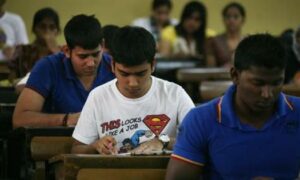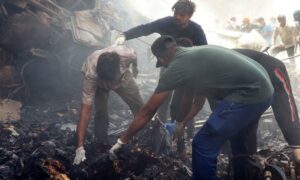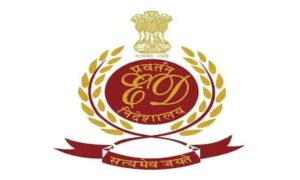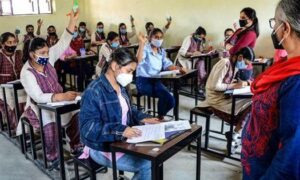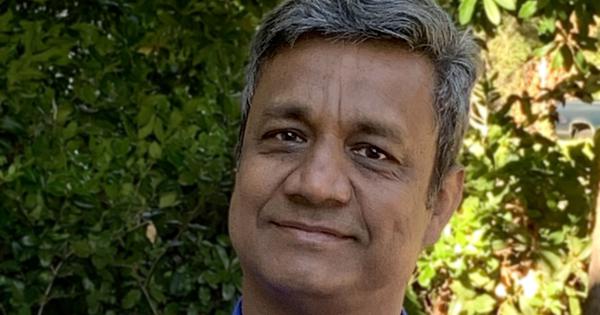
She was twenty-five, in Delhi, awaiting marriage. In those days, the future for a BA in “Home Science” was straight and narrow – generous wedding followed by uneventful married life. Aside from her short dalliance with the boy – she cannot but think of him as a boy now – college had been pleasant. Quiet classes, lazy afternoons, cheerful banter and endless cups of tea in the canteen. And debates. Yes, the debates, an amusing conceit – young boys and girls holding forth on literature, art, philosophy and religion, striding about college corridors as intellectual giants, a copy of Bertrand Russell’s History of Western Philosophy tucked under the arm – Cliff Notes into Kant, Hegel and Marx that enabled one to casually mention both the Categorical Imperative and the owl of Minerva when answering questions on stage. There always were questions, and the answers impressed even themselves. All those arguments, built atop each other. They had all made sense then – they were cogent and carefully constructed, and everything was sequitur. Sequitur. They used that word a lot in those debates. It had a pleasant Latin ring. It sounded mathematical, scientific and frightfully erudite. It was satisfying to respond to your opponent with “That is a non-sequitur”.
Then she got her BA and was home, in a posh colony in Delhi where the houses were arranged around a park. Morning and evening, the park saw walkers and joggers, and groundskeepers who fought the feckless battle of green grass against Delhi heat. Long hoses lay curled like snakes throughout the park, their mouths dripping in defiance of the “summer water shortage” everyone was always bemoaning. She rose late, walked in the park – this passed for exercise – sat around the house, watched television, helped her mother with chores when asked. She overheard wisps of conversation between her parents as they discussed possible matches for her. There was the problem of her elder sister, who had been married into a wealthy family to a boy everyone still regarded as perfect. By the law of the park, the second match had to be better than the first, a task made difficult because she was not, as even her mother conceded, more eligible than her sister. Matrimonial pages were full of brides who had good college degrees and “milky” skin combined with the twin attributes of “homely” and “comely”. In the one advertisement her father was prevailed on to place, she was described as possessed of ‘wheatish’ skin, a euphemism for ‘dark’ that was understood by both parties and therefore ineffective. Many years later, in San Francisco, she had looked at Marianne’s dark hair and milky skin (Marianne was third-generation Mexican) and said to her, “You’d be the most beautiful woman in Delhi. Fair, yet not pale like Chris.”
Marianne had laughed. “I should move to India. I’ll get me a husband after all.”
“We’d have to hide the tattoos.”
That one advertisement brought responses from families of boys who had similarly wheatish skin. Her father met a few – photos were notoriously unreliable – and turned them all down.
No one had the slightest inkling, of course, of the one boy who had poured into her his sweetest thoughts and most ardent desires. They had met at one of the debates. Art, to be art, need not appeal to the untrained mind. A toss had determined that she was for the proposition. He was against. She laid out her case. Could one enjoy Indian classical music without an initiation into it? Or Chinese painting? She had no understanding of either but both seemed worthy claimants of this privilege. She saw the judges – professors from her college – nod appreciatively, and was so pleased with herself that she barely heard his rebuttal. She won. Their romance blossomed slowly – they were too busy trying to impress each other. In due course, it was consummated in the most prosaic manner – his insistence getting the better of her defences. Guilt consumed her. She knew some of the girls around the park were not virgins but she had never imagined herself as one of them. No one ever found out, at least no one she knew, and the end of college ended the romance. She did not pursue him – it would have been vulgar to insist that he marry her, and she was not keen to marry him anyway. Moreover (she said to herself in a feminist pique), marriage to him would be a non-sequitur.
In her father’s mind, though, marriage was clearly the next step for her, so her thoughts were soon occupied not by the loss of her beloved but the impending adventure of married life. Into her imagination were thrown the horror stories told by girls in college – dictatorial mothers-in-law, husbands who drank, families that sank slowly into the cruel indignity of the middle class. Home Science had prepared her for nothing but “scientific and modern ways of managing a home”. A girl’s life was precariously poised between a match made in heaven and one that doomed her for life. And she had only one shot at it.
She was relieved when her parents settled on a boy who was in America, for reasons other than theirs. To them, he represented an advance over the match they had found for their first daughter. To her, his American-ness was an indicator of sexual maturity and experience, and a willingness to accept hers. The boy’s family were not particularly distinguished. They weren’t from Delhi but Meerut – the very name screamed “backwater” – where the boy’s father had a shop. With the boy likely to remain in America, his brother was destined to take over the family business. Against this provincial background stood the boy himself – an engineering degree and a job in California. He was seven years older than her – a large difference but not unacceptably so, given that her parents were six years apart and her sister was four years younger than her husband. Had the boy been from a business family in Delhi, he would have been considered somewhat old – why is he unmarried at thirty-two? Have his parents been sitting on their hands, or is there something wrong with him? But for a boy who had made his way in America through college and jobs, the delay was forgivable, even expected. It was universally agreed, by the salwar-clad ladies who walked the park every evening, that the match represented a step upward. Not much was known of the boy’s looks or his family wealth, and the tidbits that filtered through the park were not complimentary, but his station in America nipped all sniping. Neighbours were satisfied, critics silenced. Usha herself was somewhat excited. It would have been nicer to have known the boy, but how difficult could it be to live in America with someone who had gone to a good college? She already regarded her college romance as one does an old photograph – identifiable but not recognisable.
The first meeting between the two families was not successful. Naveen’s father and elder brother, and the brother’s wife, arrived by car from Meerut. It was never properly explained why his mother did not come. Some alarm was expressed at the car itself – an Ambassador when everyone in Delhi had switched to Maruti. Lunch proceeded as lunches do – neither Naveen’s father nor his brother Pramod said a word to her, limiting themselves to approving looks and a raised hand – in lukewarm blessing – when she said namaste. After lunch, she found herself closeted with the brother’s wife – “she will be your Jithani!” her mother had gushed – who spoke no English. The conversation took place in Hindi, trudging through such subjects as the right amount of cumin in daal, ways of improving the consistency of custard, French knots in cross-stitching, the proper soap to be used for dishes and the efficient management of servants. Usha learned some more Home Science, and that her Home Science degree had not prepared her to manage a home, and that Home Science, as practised, was even drier than the version taught in college. The gloom was lifted by the knowledge that, except for an obligatory visit to Meerut after her wedding – during which visit she would be coddled as new brides are – she would fly straight to America with her husband, there to live a new life.
The visit had seemed inconclusive to Usha, but not to her father or Naveen’s, because negotiations were quickly concluded after lunch. A photographer was summoned and a family photograph taken. Everyone crowded into the living room. Chairs were brought out. Usha has seen this photograph often because it is the only one she has of Naveen’s father and brother. The women are seated – she is in the middle, her mother and sister on one side, Pramod’s wife on the other. The men stand behind them – Naveen’s brother, his father and Usha’s father. The bride’s side is mixed up with the groom’s, perhaps a comment on the union of the two families. Pramod is not smiling. No one is smiling. It looks like the photo of a graduating class. That was how they took photos then. The occasion was special, so they had all composed their faces. To smile would have been frivolous.
Excerpted with permission from Every Room Has a View, Sujit Saraf, Speaking Tiger Books.
📰 Crime Today News is proudly sponsored by DRYFRUIT & CO – A Brand by eFabby Global LLC
Design & Developed by Yes Mom Hosting


